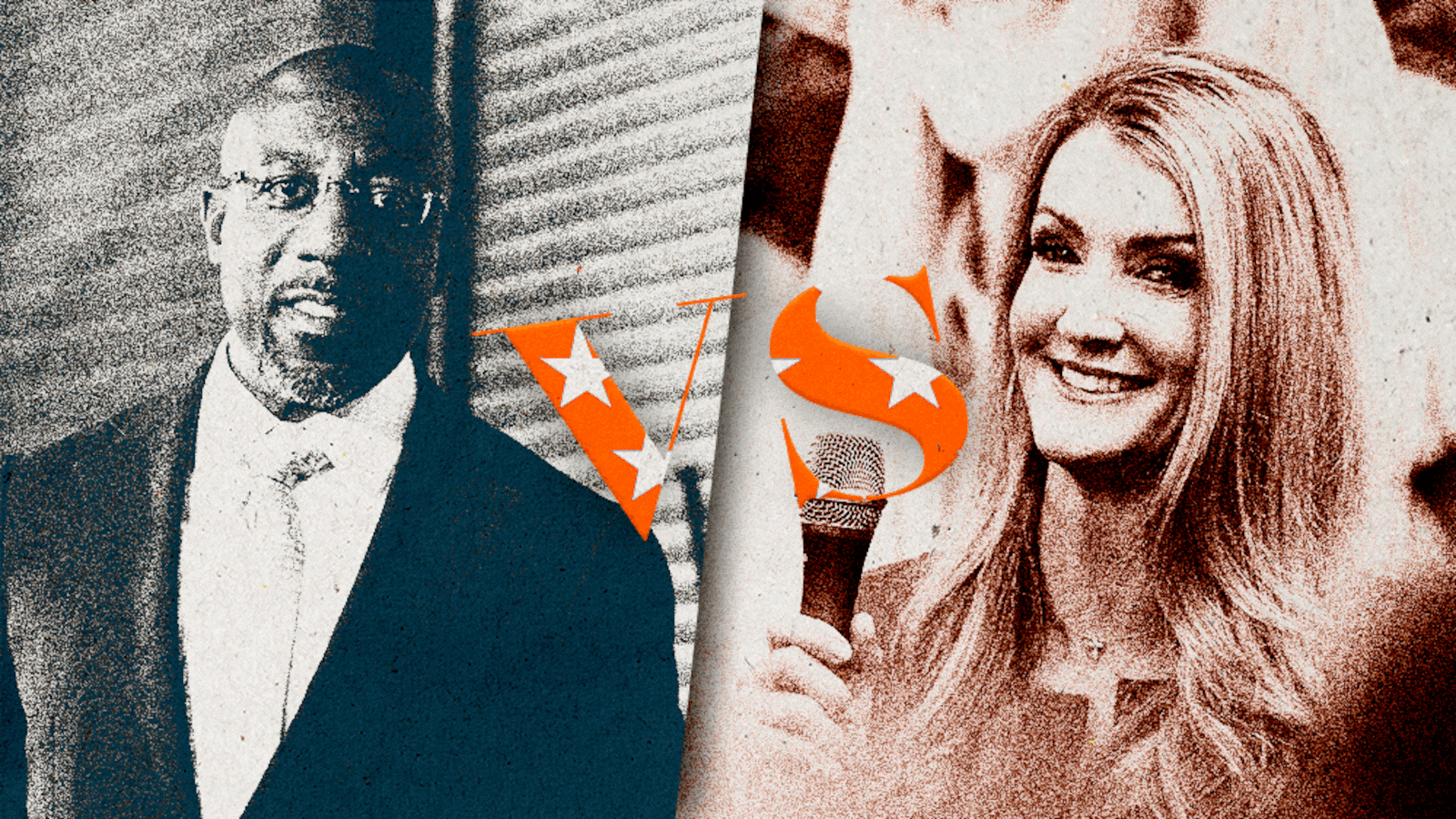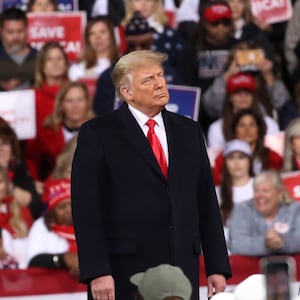ATLANTA—Georgia’s two pivotal Senate runoffs had their biggest moment yet on Sunday—the first, and perhaps only, debate of the campaign. But the night was defined by a striking split-screen.
One hour of televised debate was allotted for the candidates in one race, Sen. Kelly Loeffler (R-GA) and Democrat Raphael Warnock, and a separate hour of debate was allotted for candidates in the other race, Sen. David Perdue (R-GA) and Democrat Jon Ossoff.
During their hour, Loeffler (R-GA) and Warnock traded brutal attacks that underscored how heated this crucial contest for control of the Senate has become.
Loeffler called her opponent “radical liberal Raphael Warnock” no fewer than 10 times, as if the GOP’s branding were his legal name. And Warnock, along with moderators, pressed Loeffler on President Trump’s refusal to concede the election, and his baseless claims that Georgia’s election system was rigged—forcing the staunch Trump ally to repeatedly resort to uncomfortable canned answers to avoid the reality that Joe Biden won fair and square.
In the other hour, however, there was no rancorous trading of barbs between Ossoff and Perdue or pressing questions for the candidates. There was just Ossoff, standing next to an empty podium where Perdue would have been, if the incumbent had not skipped the debate entirely.
So far, each party’s set of candidates in the two runoffs have campaigned as something like running-mates, appearing together at campaign stops and fundraisers, and sharing nearly the same policy platforms and attacks on their opponents. Democrats need to win both in order to take control of the Senate. But Sunday’s debates were a pointed reminder that the two races are separate, each with their own dynamics.
Perdue, first elected in 2014, ran ahead of Ossoff by 1.7 percentage points in the November election and perhaps calculated a debate appearance could harm more than help. Loeffler, who was appointed to her seat in 2019 and has never won an election before, and Warnock, a first-time candidate as well, moved to slog it out after a crowded general election in which they were the top two finishers.
As a result, the Warnock-Loeffler debate focused on the national stakes for both runoffs—but the two candidates also litigated the harsh lines of attack that have defined their race, specifically.
Loeffler was like the attack ads dominating the Georgia airwaves come to life, casting Warnock as a police-hating, military-disrespecting radical socialist who would be a “rubber stamp” for a far-left agenda in the Senate. And she sought to undermine his credibility as a religious leader by accusing him of using the Bible as justification for nefarious ends.
Warnock, meanwhile, echoed his side’s own ubiquitous attack lines, casting Loeffler as a purely self-interested paragon of wealth, out of touch with ordinary Georgians, who has opposed COVID-19 relief while offloading her stock holdings after being briefed early about the spread of the coronavirus.
"She has spent the first 10 months of her tenure thinking about herself,” said Warnock at one point. “She was appointed, the people of Georgia have been disappointed.”
But the most striking moments of the debate came when Loeffler was asked about Trump and the 2020 election. She was asked twice if she acknowledged Trump lost the election, and was also asked if the president was wrong to say last night at a rally in Georgia that Gov. Brian Kemp—who appointed Loeffler to the seat—should be primaried because he presided over an election that was allegedly stolen from Trump.
"The president has the right to pursue every legal recourse," Loeffler said, in some form, at least four times. From the debate stage, she stopped short of airing the conspiracies that Trump put forth on Saturday from the rally stage, but said "it's very clear there were issues in this election,” without naming anything specifically.
And when it came to a question about whether she acknowledged that the very fact that the Senate is on the line in these runoffs necessarily means that Biden won the election, she answered without really answering. "What’s at stake is the Senate majority," said Loeffler.
The Republican also bristled under scrutiny of her record on stock-trading during the early months of the pandemic. In March, The Daily Beast reported that Loeffler offloaded millions of dollars worth of stock holdings after a private briefing for senators about the coronavirus in January. Asked if she believed senators should be banned from owning stock, Loeffler said, "what's at stake in this election is the American dream," and suggested that criticism of her record from “left-wing” media was an affront to that American dream.
Loeffler’s refusal to answer questions about Trump—whose support will be critical to her chances in the runoff—among others made Warnock’s own evasions look minor in comparison. But he also dodged key questions posed to him about what he’d do if elected as part of a Democratic Senate majority. Asked if he supported expanding the size of the U.S. Supreme Court, an idea that gained steam on the left wing of the party this year, Warnock did not answer, saying, "I'm really not focused on it.”
If Warnock and Loeffler’s debate was a sometimes-messy, bitter exchange of attacks, Ossoff’s hour amounted to free, uncontested airtime for the 33-year old Democrat challenging Perdue.
Georgia Democrats believe that the two candidates’ last meeting, before the November election, scared the incumbent off. In their October debate, Ossoff launched blistering attacks, focusing in particular on Perdue’s coronavirus stock trades and going so far as to call the senator a “crook” to his face. And Ossoff, who is Jewish, blasted Perdue for GOP outside groups’ attack ads, in which his nose was edited to look larger.
Alone on the debate stage Sunday, Ossoff resurfaced many of those same attacks, and used his opponent’s absence to claim that he was afraid of tough questions on his stock trading activity and to argue he felt “entitled” to Georgians’ votes and therefore didn’t need to show up.
“People expect me to come to a debate like this and criticize David Perdue,” Ossoff said in his closing statement. “But it shows an astonishing arrogance and sense of entitlement for Georgia’s senior U.S. Senator to believe he shouldn't have to debate at a moment like this in our history.”
But Ossoff faced questions of his own from a panel of Georgia journalists on a range of topics, from the wisdom of imposing additional COVID-19 restrictions to his scorching attacks on Perdue’s stock trading activity.
Asked by the moderator, local Fox anchor Russ Spencer, if Ossoff “conceded the point” that Perdue had been cleared by federal authorities, for example, the Democrat said no. While investigators at the Securities and Exchange Commission and the Department of Justice have ended probes into Perdue’s trading without filing charges, Perdue has claimed in ads that he has been “exonerated,” which is not a statement that the federal agencies involved typically make in such cases.
“I haven't seen one shred of evidence that David Perdue has presented that any federal agency has cleared him,” said Ossoff. “What I observe is he has not yet been indicted.”
For 30 minutes, Ossoff was largely given free rein to define the race on his terms and reprise his case against Perdue in front of perhaps his biggest audience yet. If he had one question to ask Perdue, Ossoff said it would be why he opposes $1,200 stimulus checks as part of coronavirus relief. And he plainly stated his view of the national stakes of the two runoffs.
“If we don’t win these two Senate races,” he said, Republicans will “try to do to the Biden-Harris administration what they tried to do to President Obama.”







